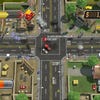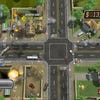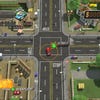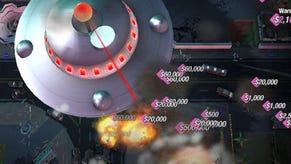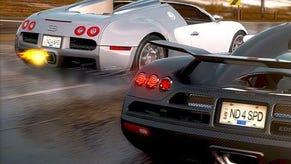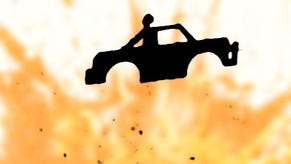Burnout Crash
Calm down dear.
You get arrows warning you which direction cars will be coming from, so you can put yourself in their path or shunt wrecks to block the road. When it works, there's a refreshing depth to the gameplay, especially as no blockade lasts forever. That big tangle of metal that's ensnaring every car that tries to get through is a chain reaction waiting to happen, and sooner or later something will explode, scattering and detonating everything else.
There are also periodic special events, building up to the climactic "special feature" in which a natural disaster, misguided airliner or vengeful UFO sweeps the stage clear, its force dependent on how many cars you let through.
The pieces are all there, but the five-car limit is punishing and quickly overwhelms the pleasure of the moment-to-moment gameplay. As you enter the final trio of junctions, success really is down to blind luck as much as skill, as the slightest mistake sends three or four vehicles sailing past unscathed, often dodging your makeshift barriers by a few pixels. The Crashbreaker also skews things, its slow recharge ensuring that failure begets more failure until you're left in a position where you literally have no chance of success. On the later stages, this can happen in a matter of seconds, leading to mind-numbing trial and error.
It's infuriating, since passing Road Trip (or at least earning one star) then grants you access to Rush Hour, the game mode that feels most like the original Crash Mode. Here, you get 90 seconds to wreak as much havoc as possible without worrying too much about how many cars escape your sociopathic rampage. Freed up from micro-management, you can bounce around, discover the hidden scoring opportunities and generally have a lot more fun. Also unlocked is Pile Up, in which you have a small number of cars to stop and must then keep things burning for as long as possible with well-timed trigger explosions.
Burnout Crash is also a high-score game with no global leaderboard. Everything is managed via the Autolog system introduced by Criterion in Need for Speed: Hot Pursuit. This means that if none of your friends are playing Crash, you'll be the only person on the leaderboard (and you'll be unable to earn certain Achievements as a result). The game generously encourages you to send an advert to your Friends List, encouraging them to join you. It will also search for friends of friends who are playing. It didn't turn anyone up for me, but the thought is there.
If you have a bulging social network full of people playing Burnout Crash, then it's a great idea. If you don't, well, a leaderboard with two or three people isn't much of a leaderboard, especially if those few players don't keep playing and raising the stakes.
You can, of course, play offline in a party mode setting (where the optional and surprisingly good Kinect controls make more sense) but there's still a feeling that a large chunk of the game's appeal hinges more on what your virtual friends are doing than your own achievements. Beating the levels is a victory of sorts, but Autolog is thrust in your face so often that it feels compromised without an active network of fellow players to measure yourself against.
It's a game where small shunts can lead to calamitous destruction, and so it proves in the design. A couple of tweaks to the menu, a different sequence of unlocks, and Burnout Crash would be a joy. If Rush Hour were the default mode rather than the infuriating Road Trip, if the difficulty could be flexible allowing you more leeway than the five car limit allows, players would have more time to revel in the destruction rather than gnawing their knuckles. They'd spend more time playing the game and less time fighting against it.
The curious structure of Burnout Crash makes the overall experience one of giddy highs punctuated by fist-clenching lows, and as such it's very difficult to recommend with any confidence. It's as if Criterion had baked a delicious cake then told players they could only eat it with cocktail sticks while wearing oven gloves. As tasty as the end result might be, it can't help spoiling the party mood.

